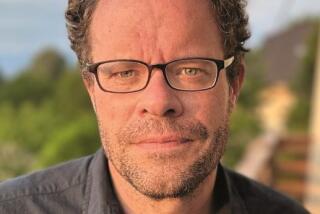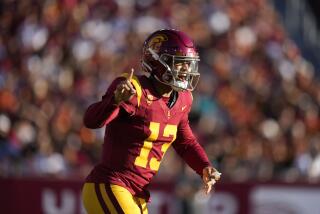Somewhere to Go
- Share via
The interview ends, and the athlete runs.
That is how it happens in my business.
The moment the last question is answered, the athlete stands up and jogs away, teammates to see, places to be, roles to fill.
So it is that, when I finish interviewing star tackle Darrion Weems of Taft High this week, I shake his hand and back away.
But he doesn’t move.
In this garage that serves as the team meeting room, the 6-foot-5, 267-pound junior remains stuck to his tiny plastic chair.
He quietly stares at the concrete floor. He nervously shreds bits of his mimeographed school schedule.
All around him, teammates are strapping helmets and slapping hands and Weems, wearing borrowed clothes and a begging frown, doesn’t move.
“You know,” he says, “I’m not really sure where to go.”
Two weeks ago, as a junior at McMain High in New Orleans, he knew.
But Hurricane Katrina took his house, his school, his team, everything but the McMain Mustang shorts and shirt he wore during the evacuation.
He has since relocated to Woodland Hills. He sleeps on an air mattress on a strange floor in a house apart from his parents.
One of his siblings, a younger half-sister, is still missing. Others are scattered across the country.
He can’t find his old coach, his teammates are in four different states, every bit of his old life is gone.
But he’s one of the lucky ones. Because he has somewhere to go. He has a team. A strange team. But soon, with any luck, it will be his team.
As disasters consistently remind us, few things begin the healing process faster than sports.
After I interview Darrion Weems on his first day of school, his first day with the team, this healing begins.
He doesn’t move, but the confusion doesn’t last long.
“C’mon,” said Sean Pollard, Taft’s defensive coordinator, walking over and laying a strong hand on a giant shoulder. “Let’s get you taken care of.”
*
The last time America suffered a tragedy this huge, sports’ contribution was sweeping and sentimental.
Remember President Bush taking the mound and throwing a strike before a post-9/11 World Series game at Yankee Stadium?
Remember every arena playing, “God Bless America?”
This time, in the wake of Katrina, sports’ contributions will occur on a smaller, more personal scale, showing up first on high school football fields across America as children of evacuees begin new lives as athletes and cheerleaders and musicians.
The impact of sports won’t be as dramatic as what occurred after 9/11. But, from the sound of Darrion Weems’ father’s voice, it will be no less compelling.
“Our lives have been devastated,” says Paul Malbrough, a longtime New Orleans stucco contractor.
“But football gives my son a place to go. It gives all of us a place to go. It makes us feel a little normal again. That’s what sports does, you know?”
Back home, Malbrough’s wife and most of his nine children were known as the “Weemermaniacs.”
They would show up at Darrion’s game and chant his nickname -- “Debo” -- and cheer as he did things like recover fumbles and block field goals.
He had one of each in McMain’s season opener, a week before the hurricane.
“He is a reclusive kid who finally found something he loved,” says Malbrough. “This was going to be the year he found out who he was.”
College coaches think they know who he is, his father claiming that Louisiana State, Ole Miss and Louisiana Tech were already pursuing him, and recruiting websites acknowledging his potential legitimacy.
“This was the year he became a monster,” says his father.
Then a monster drove them from their home, six members of the family piling into a rented SUV on the day before Katrina hit.
They thought they would be returning to New Orleans in a couple of days, so they didn’t pack any clothes or bring much money, camping out in a Memphis, Tenn., hotel until the danger passed.
“We watched on TV as our whole lives disappeared,” remembers Malbrough.
Like their son, though, they were some of the lucky ones.
They had family in Woodland Hills -- Weems lived there for the first 11 years of his life -- and they had nearly enough money to drive there.
They reached New Mexico with the wallet and gas tank both on empty when strangers noticed their Louisiana license plates. One walked up and pressed $50 into their hands. Another gave them $20. It was enough to finish the journey.
“We wanted to settle right away to get the kids in a stable environment,” Malbrough says. “We didn’t want them to worry. My wife and I would do the worrying. That’s the American family, isn’t it?”
Some of them are living with Weems’ grandmother. Weems is living a few miles away with an older brother who also attended Taft.
One of the first things they did upon reaching Los Angeles was buy Weems some cleats.
“He lost all of his football stuff, everything; we just wanted to get him something to keep him going,” says his father.
Soon thereafter, they showed up at school and, while this may be the wrong time, it is certainly the right place.
Taft has produced many top football players, most recently USC wide receiver Steve Smith. If Weems worries that those recruiters won’t find him, well, they will.
The important thing, perhaps, is that, through sports, Weems and many other evacuee children nationwide will have a chance to find themselves.
“We’ve seen sports work this type of healing happen before,” said Troy Starr, Taft’s coach. “Looks like it’s going to happen again.”
Starr had never heard of Weems before he enrolled. He checked him out on a website.
“He’s a pretty good player, I think he will help us, but this is about a lot more than that,” says Starr. “There’s a place for him here. The players on this team are good kids who will take care of him.”
Starr didn’t play him in Taft’s opener Thursday because he wanted Weems to get settled, but relaxed eligibility rules should allow him to play as soon as next week.
But so far, his new teammates were discussing him in terms that had nothing to do with football.
“It’s hard to imagine what he’s going through,” says Malcolm Smith, running back and brother of Steve. “Everybody’s looking at him like he’s only here for football, and he’s worried about so much other stuff. We’re all going to try to make him comfortable.”
That will take time.
Darrion Weems has no trophies or scrapbooks or uniforms or anything to remind him that he ever played football in New Orleans. He doesn’t even own a football.
All he has is fall Friday nights, him on a field, his family in the stands, some tiny scrap of normality returning.
Says his father: “We’re broke, we don’t know what we’re going to do, but we’ll be there every game cheering for Debo. It’s one of the ways we’ll go on living.”
For now, it will have to be enough.
“I’m looking for somewhere to fit in,” says Weems, the noise of slapping pads and clanging cleats rising above his soft voice. “Maybe here I can fit in.”
*
Bill Plaschke can be reached at bill.plaschke@latimes.com. To read previous Plaschke columns, go to latimes.com/plaschke.
More to Read
Get our high school sports newsletter
Prep Rally is devoted to the SoCal high school sports experience, bringing you scores, stories and a behind-the-scenes look at what makes prep sports so popular.
You may occasionally receive promotional content from the Los Angeles Times.







